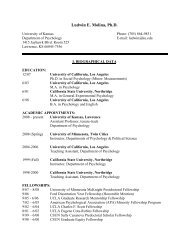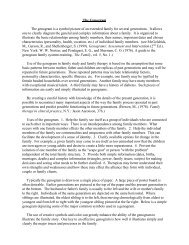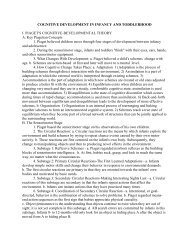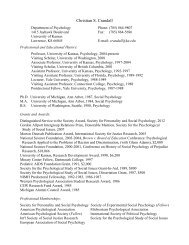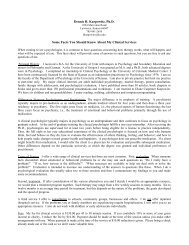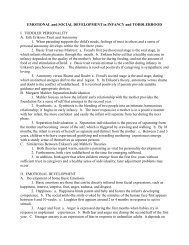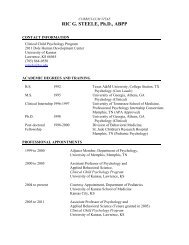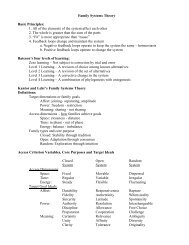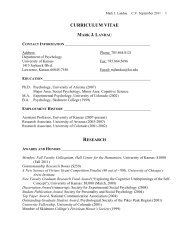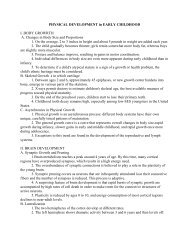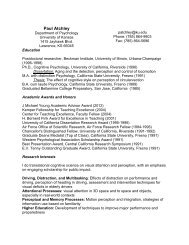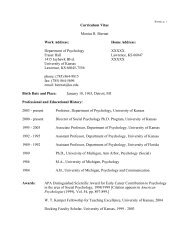Download as a PDF - CiteSeer
Download as a PDF - CiteSeer
Download as a PDF - CiteSeer
You also want an ePaper? Increase the reach of your titles
YUMPU automatically turns print PDFs into web optimized ePapers that Google loves.
Address: 1415 Jayhawk Blvd<br />
Lawrence, KS 66045<br />
Work Phone: (785) 864-9804<br />
Work FAX: (785) 864-5323<br />
Citizenship: U.S.A.<br />
Date of Birth: September 6, 1960<br />
CURRENT APPOINTMENTS:<br />
TODD D. LITTLE<br />
University of Kans<strong>as</strong><br />
Department of Psychology<br />
Center for Research Methods and Data Analysis<br />
Schiefelbusch Institute for Life Span Studies<br />
Ph.D., Developmental Psychology<br />
University of California, Riverside: December, 1988<br />
B.A., English Literature<br />
University of California, Riverside: June, 1983<br />
RESEARCH AND TEACHING POSITIONS<br />
e-Mail: yhat@ku.edu<br />
Department web: www.Psych.KU.edu<br />
RMDA Center: www.Quant.KU.edu<br />
Quant Psych web: www.Quant.KU.edu<br />
Summer Institute: www.Quant.KU.edu<br />
Professor (8/06 to present): Department of Psychology<br />
Director, Quantitative Training Program<br />
Director, Center for Research Methods and Data Analysis<br />
Research Scientist (8/02 to present): Schiefelbusch Institute for Life Span Studies<br />
Scientific Director, Research Design and Analysis Core<br />
PAST APPOINTMENTS:<br />
Associate Professor (8/02 to 07/06): University of Kans<strong>as</strong>, Department of Psychology<br />
Assistant Professor (7/98 to 6/02): Yale University, Department of Psychology<br />
Lead investigator, Agency in Development project (7/99 to 6/02)<br />
Faculty Research Scientist (8/91 to 7/98)<br />
Max Planck Institute for Human Development, Center for Lifespan Psychology<br />
Co-Lead investigator, Action Control and Child Development project<br />
(10/92 to 7/96; co-directed with Paul Baltes and Gabriele Oettingen)<br />
Co-Lead investigator, Self-Regulation and Social Relations project<br />
(8/96 to 7/98; co-directed with Lothar Krappmann)<br />
Postdoctoral Research Fellow (1/89 to 7/91): University of California, Riverside<br />
Lifespan development of adaptive behaviors (K. Widaman, principal investigator)<br />
Adolescent self-concept and school dropout (D. MacMillan, principal investigator)<br />
Lecturer (9/85 to 8/93):<br />
Boston University, European Division (8/92 to 8/93; Graduate Psychology Program)<br />
California State University, San Bernardino (12/86 to 7/91; Department of Psychology)<br />
University of California, Riverside (9/85 to 12/88; Department of Psychology)<br />
CURRICULUM VITAE: December, 2009
*Denotes shared senior author responsibility<br />
RESEARCH INTERESTS<br />
Developmental Psychology: Action-Control Processes; Motivation; Self-regulation; School<br />
Achievement; Peer and Friendship Relationships; Adjustment and Well-being; The Social-<br />
Personality Nexus; Cross-Cultural and Socio-contextual Influences; Childhood & Adolescence.<br />
Statistics and Methodology: Modeling Individual, Group, and Developmental Differences; General<br />
Structural Equations Modeling Techniques (e.g., LISREL, MACS, Growth Curve, HLM), Construct<br />
Validation; Me<strong>as</strong>urement; Selection Effects, Missing data estimation.<br />
JOURNAL ARTICLES<br />
PUBLICATIONS<br />
Biggs, B. K., Vernberg, E. M., Fonagy, P., Twemlow, S. W., Little, T. D., & Dill, E. J. (in press). Peer<br />
victimization trajectories and their <strong>as</strong>sociation with internalizing problems in middle childhood.<br />
International Journal of Behavioral Development, 00, 000-000.<br />
Kärnä, A., Voeten, M., Little, T. D., Poskiparta, E., Kaljonen, A., Salmivalli, C. (in press). A largescale<br />
evaluation of the KiVa anti-bullying program. Developmental Psychology, 00, 000-000<br />
Ojanen, T., & Little, T. D. (in press) Modeling contextual effects in developmental research: Linking<br />
theory and method in the study of social development, Social Development, 00, 000-000.<br />
Ojanen, T., Sijtsema, J. J., Hawley, P. H., & Little, T. D. (in press). Intrinsic and extrinsic motivation<br />
in early adolescents’ friendship development: Friendship selection, influence, and prospective<br />
friendship quality. Journal of Adolescence, 00, 000-000.<br />
Okech, D., & Little, T. D. (in press). Parental self-efficacy and joining a savings program for children’s<br />
education. Research on Social Work Practice, 00, 000-000.<br />
Roche, K. M., Ghazarian, S. R., Little, T. D., & Leventhal, T., (in press). Understanding links between<br />
punitive parenting and adolescent adjustment: The relevance of context and reciprocal<br />
<strong>as</strong>sociations. Journal of Research on Adolescence, 00, 000-000.<br />
Sijtsema, J. J., Ojanen, T., Veenstra, R., Lindenberg, S., Hawley, P. H., & Little, T. D. (in press). Forms<br />
and functions of aggression in adolescent friendship selection and influence: A longitudinal<br />
social network analysis. Social Development, 00, 000-000.<br />
Vernberg, E. M., Nelson, J. M., Jacobs, A. K., Little, T. D., Twemlow, S. W., Fonagy, P., et al. (in press).<br />
Developmental trends in peer aggression, victimization, bystanding, and aggression-related<br />
attitudes. Aggressive Behavior, 00, 000-000.<br />
Blaga. O. M., Shaddy, D. J., Anderson, C. J., Kann<strong>as</strong>s, K. N., Little, T. D., & Colombo, J. (2009).<br />
Structure and continuity of intellectual development in early childhood. Intelligence, 37, 106-<br />
113.<br />
Dreer, L. E., Berry, J., Rivera, P., Elliott, T. R., Swanson, M., Miller, D., & Little, T. D. (2009). Efficient<br />
<strong>as</strong>sessment of social problem-solving abilities in medical and rehabilitation settings: A R<strong>as</strong>ch<br />
analysis of the social problem-solving inventory-revised (SPSI-R). Journal of Clinical<br />
Psychology, 65, 653-669.<br />
Fonagy, P., Twemlow, S. W., Vernberg, E. M., Nelson, J. M., Dill, E. J., Little, T. D., et al. (2009). A<br />
cluster randomized controlled trial of a child-focused psychiatric consultation and a school<br />
systems-focused intervention to reduce aggression. Journal of Child Psychology and Psychiatry,<br />
50, 607-616.<br />
2
Lee, S-H., Soukup, J. H., Little, T. D., & Wehmeyer, M. L., (2009). Student and teacher variables<br />
contributing to access to the general education curriculum for students with intellectual and<br />
developmental disabilities. Journal of Special Education, 43, 29-44.<br />
Nelson, E., Atchley, P., & Little, T. D. (2009). The effects of perception of risk and importance of<br />
answering and initiating a cellular phone call while driving. Accident Analysis & Prevention, 41,<br />
438-444.<br />
Perez, J. E., Little, T. D., & Henrich, C. C. (2009) Spirituality and depressive symptoms in a schoolb<strong>as</strong>ed<br />
sample of adolescents: A longitudinal investigation of mediated and moderated effects.<br />
Journal of Adolescent Health, 44, 380-386.<br />
Sanislow, C. A, Little, T. D., et al. (2009) Ten-year stability and latent structure of the DSM-IV<br />
schizotypal, borderline, avoidant, and obsessive compulsive personality disorders. Journal of<br />
Abnormal Psychology, 118, 507-519.<br />
Wehmeyer, M. L., Chapman, T. E., Little, T. D., Thompson, J. R., Schalock, R. L., & T<strong>as</strong>se, M. J. (2009).<br />
The efficacy of the supports intensity scale (SIS) to predict extraordinary support needs.<br />
American Journal on Mental Retardation, 114, 3-14.<br />
Card, N. A., Stucky, B. D., Sawalani, G. M., & Little, T. D. (2008). Direct and indirect aggression<br />
during childhood and adolescence: A meta-analytic review of gender differences,<br />
intercorrelations, and relations to maladjustment. Child Development, 79, 1185-1229.<br />
Catts, H. W., Bridges, M. S., Little, T. D., & Tomblin, J. B. (2008). Reading achievement growth in<br />
children with language impairments. Journal of Speech, Language, and Hearing Research, 51,<br />
1185-1229.<br />
Hawley, P. H., Little, T. D., & Card, N. A. (2008). The myth of the alpha male: A new look at<br />
dominance-related beliefs and behaviors among adolescent males and females. International<br />
Journal of Behavioral Development, 32, 76-88.<br />
Lee, S-H., Wehmeyer, M. L., Palmer, S. B., Soukup, J. H., & Little, T. D. (2008). Self-determination and<br />
access to the general education curriculum. Journal of Special Education, 42, 92-107.<br />
Malmberg, L-E., Wanner, B., & Little, T. D. (2008). Age and school-type differences in children’s<br />
beliefs about school performance. International Journal of Behavioral Development, 32, 531-<br />
541.<br />
Shogren, K. A., Wehmeyer, M. L., Palmer, S. B., Soukup, J. H., Little, T. D., Garner, N. & Lawrence, M.<br />
(2008). Understanding the construct of self-determination: Examining the relationship between<br />
the Arc's self-determination scale and the American Institutes for Research self-determination<br />
scale. Assessment for Effective Intervention, 33, 94-107.<br />
Singh, S., Donavan, T. D., Mishra, S., & Little, T. D. (2008).The latent structure of landscape<br />
perception: A mean and covariance structure modeling approach. Journal of Environmental<br />
Psychology, 28, 339-352<br />
Card, N. A. & Little, T. D. (2007). Longitudinal modeling of developmental processes. International<br />
Journal of Behavioral Development, 31, 297-302.<br />
Hawley, P. H., Card, N. A., & Little, T. D. (2007). The allure of a mean friend: Relationship quality and<br />
processes of aggressive adolescents. International Journal of Behavioral Development, 31, 170-<br />
180.<br />
Little, T. D., Preacher, K. J., Selig, J. P., & Card, N. A. (2007). New developments in SEM panel<br />
analyses of longitudinal data. International Journal of Behavioral Development, 31, 357-365.<br />
3
Malmberg, L-E., & Little, T. D. (2007). Profiles of ability, effort, and difficulty: relationships with<br />
worldviews, motivation and adjustment. Learning and Instruction, 17, 739-754.<br />
Marsh, H. W., Wen, Z., Hau, K-T., Little, T. D., Bovaird, J. A., & Widaman, K. F. (2007). Unconstrained<br />
structural equation models of latent interactions: Contr<strong>as</strong>ting residual- and mean-centered<br />
approaches. Structural Equation Modeling, 14, 570-580<br />
Shogren, K. A., Wehmeyer, M. L., Palmer, S. B., Soukup, J. H., Little, T. D., Garner, N. & Lawrence, M.<br />
(2007). Examining individual and ecological predictors of the self-determination of students with<br />
disabilities. Exceptional Children, 73, 488-509.<br />
Shorey, H. S., Little, T. D., Snyder, C. R., Kluck, B., & Robitschek, C. (2007). Hope and personal<br />
growth initiative: A comparison of positive, future-oriented constructs. Personality and<br />
Individual Differences, 43, 1917-1926.<br />
Adlof, S. M., Catts, H. W., & Little, T. D. (2006). Should the simple view of reading include a fluency<br />
component? Reading and Writing: An Interdisciplinary Journal, 19, 933-958.<br />
Boardman, T., Catley, D., Grobe, J. E., Little, T. D., Ahluwalia, J. S. (2006). Using motivational<br />
interviewing with smokers: Do therapist behaviors relate to engagement and therapeutic<br />
alliance? Journal of Substance Abuse Treatment, 31, 329-339.<br />
Card, N. A., & Little, T. D. (2006b). Proactive and reactive aggression in childhood and adolescence:<br />
A meta-analysis of differential relations with psychosocial adjustment. International Journal of<br />
Behavioral Development, 30, 466-480.<br />
Little, T. D., Bovaird, J. A., & Widaman, K. F. (2006). On the merits of orthogonalizing powered and<br />
product terms: Implications for modeling interactions among latent variables. Structural<br />
Equation Modeling, 13 ,497-519.<br />
Little, T. D., Slegers, D. W., & Card, N. A. (2006). A non-arbitrary method of identifying and scaling<br />
latent variables in SEM and MACS models. Structural Equation Modeling, 13, 59-72.<br />
Shogren, K. A., Lopez, S. J., Wehmeyer, M. L., Little, T. D., & Pressgrove, C. L. (2006). The role of positive<br />
psychology constructs in predicting life satisfaction in adolescents with and without cognitive<br />
disabilities: An exploratory study. Journal of Positive Psychology, 1, 37-52.<br />
Steele, R. G., Little, T. D., Ilardi, S. S., Forehand, R., Brody, G. H., & Hunter, H. L. (2006). A<br />
confirmatory comparison of the factor structure of the children’s depression inventory between<br />
European American and African American youth. Journal of Family and Clinical Psychology,<br />
15, 779-794.<br />
Vanlede, M., Little,* T. D., & Card, N. A. (2006). Action-control beliefs and behaviors <strong>as</strong> predictors of<br />
change in adjustment across the transition to middle school. Anxiety, Stress, and Coping, 19,<br />
111-127.<br />
Wang, M., Summers, J. A., Little, T. D., Turnbull, A., Posten, D., & Mannan, M. (2006).<br />
Perspectives of fathers and mothers of children in early intervention programmes in <strong>as</strong>sessing<br />
family quality of life. Journal of Intellectual Disability Research, 50, 977-988.<br />
Card, N. A., Hodges, E. V. E., Little, T. D., & Hawley, P.H. (2005). Gender effects in peer nominations for<br />
aggression and social status. International Journal of Behavioral Development, 29, 146-155.<br />
Fonagy, P., Tremlow, S. W., Vernberg, E. M., Sacco, F. C., & Little, T. D. (2005). Creating a peaceful<br />
school learning environment: The impact of an antibullying violence prevention program on<br />
educational attainment in elementary schools. Medical Science Monitor, 11, 31-325.<br />
4
Hogan, T. P., Catts, H. W., & Little, T. D. (2005). The relationship between phonological awareness<br />
and reading: Implications for the <strong>as</strong>sessment of phonological awareness. Language, Speech,<br />
Hearing Services in Schools, 36, 285-293.<br />
Card, N. A. & Little, T. D. (2005). On the use of the social relations and actor-partner inter-dependence<br />
models in developmental research. International Journal of Behavioral Development, 29, 173-179.<br />
Walls, T. A. & Little,* T. D. (2005). Relations among personal agency, motivation, and school adjustment<br />
in early adolescence. Journal of Educational Psychology, 97, 23-31.<br />
Wang, M., Turnbull, A., Summers, J., Little, T. D., Poston, D., Mannan, H., & Turnbull, R. (2004). Severity<br />
of disability and income <strong>as</strong> predictors of parents’ satisfaction with their family quality of life during<br />
early childhood years. Research and Practice for Persons with Severe Disabilities.<br />
Baker, C. W., Little, T. D., & Brownell, K. D. (2003). Predicting adolescent eating and activity behaviors:<br />
The role of social norms and personal agency. Health Psychology, 22, 189-198.<br />
Carter, A. S., Briggs-Gowan, M., Jones, S. M. & Little, T. D. (2003). The infant toddler social and<br />
emotional <strong>as</strong>sessment: Factor structure, reliability, and validity. Journal of Abnormal Child<br />
Psychology, 31, 495-514.<br />
Little, T. D., Brauner, J., Jones, S. M., Nock, M. K., & Hawley, P. H. (2003). Rethinking aggression: A<br />
typological examination of the functions of aggression. Merrill-Palmer Quarterly, 49, 343-369.<br />
Little, T. D., Jones, S. M., Henrich, C. C., & Hawley, P. H. (2003). Disentangling the ‘whys’ from the<br />
‘whats’ of aggressive behavior. International Journal of Behavioral Development, 27, 122-133.<br />
Little, T. D., Miy<strong>as</strong>hita, T., Kar<strong>as</strong>awa, M., M<strong>as</strong>hima, M., Oettingen, G., Azuma, H., & Baltes, P. B. (2003).<br />
The links among action-control beliefs, intellective skill, and school performance in Japanese, U.S.,<br />
and German school children. International Journal of Behavioral Development, 27, 41-48.<br />
McCarthy, P., Walls, T., Cicchetti, D., Mayes, L., Rizzo, R., Lopez-Benitez, J., Salloum, S., Baron, M.,<br />
Fink, H., Anderson, R., Little, T., LaCamera, R., & Frudigman, K. (2003). Prediction of resource use<br />
during acute pediatric illness. Archives of Pediatric Adolescent Medicine, 157, 990-996.<br />
Pearce, M. J., Perez, J. P., & Little,* T. D. (2003). Religiousness and depressive symptoms among<br />
adolescents. Journal of Clinical Child and Adolescent Psychology, 32, 267-276.<br />
Pruett, M. K., Williams, T., Insebella, G., & Little, T. D. (2003) Family and legal indicators of child<br />
adjustment to divorce among families with young children. Journal of Family Psychology, 17, 169-<br />
180.<br />
Shahar, G., Henrich, C. C., Blatt, S. J., Ryan, R. M., & Little, T. D. (2003). Interpersonal relatedness, selfdefinition,<br />
and their motivational orientation during adolescence: A theoretical and empirical<br />
investigation. Developmental Psychology, 39, 470-483.<br />
Shahar, G., Henrich, C. C., Reiner, I. C., & Little, T. D. (2003). Development and initial validation of the<br />
Brief Adolescent Life Event Scale (BALES). Anxiety, Stress, and Coping, 16, 119-127.<br />
Kunzmann, U., Little, T. D., & Smith, J. (2002). Perceiving control: A double-edged sword in old age.<br />
Journals of Gerontology, 57, 484-491.<br />
Hawley, P. H., Little, T. D., & P<strong>as</strong>upathi, M. (2002). Winning friends and influencing peers: Strategies of<br />
peer influence in late childhood. International Journal of Behavioral Development, 26, 466-474.<br />
Little, T. D., Cunningham, W. A., Shahar, G., & Widaman, K. F. (2002). To parcel or not to parcel:<br />
Exploring the question, weighing the merits. Structural Equation Modeling, 9, 151-173.<br />
5
Little, T. D., Lopez, D. F., Oettingen, G. O., & Baltes, P. B. (2001). A comparative-longitudinal study of<br />
action-control beliefs and school performance: On the role of context. International Journal of<br />
Behavioral Development, 25, 237-245.<br />
Little, T. D., Lopez, D. F., & Wanner, B. (2001). Children’s action-control behaviors (Coping): A<br />
longitudinal validation of the behavioral inventory of strategic control. Anxiety, Stress, and Coping,<br />
14, 315-336.<br />
Malmberg, L-E., Wanner, B., Sumra, S., & Little, T. D. (2001). Action-control beliefs and school<br />
experiences of Tanzanian primary school students. Journal of Cross-Cultural Psychology, 32, 577-596.<br />
Whiteside-Mansell, L., Bradley, R. H., Little, T. D., Corwyn, R., Spiker, D. (2001). An examination of<br />
cross-racial comparability of mother-child interactions among African-American and Anglo-<br />
American families. Journal of Marriage and Family, 63, 767-778.<br />
Brendgen, M., Little,* T. D., & Krappmann,* L. (2000). Rejected children and their friends: A shared<br />
evaluation of friendship quality? Merrill Palmer Quarterly, 46, 45-70.<br />
Little, T. D. (2000). On the comparability of constructs in cross-cultural research: A critique of Cheung<br />
and Rensvold. Journal of Cross-Cultural Psychology, 31, 213-219.<br />
Little, T. D. (2000). The millennial challenge: Modeling the agentic self in context. International Journal<br />
of Behavioral Development, 24, 149-153.<br />
Kunzmann, U., Little, T. D., & Smith, J. (2000). Is Age related stability of subjective well-being a<br />
paradox? Cross-sectional and longitudinal evidence from the Berlin aging study. Psychology and<br />
Aging, 15, 511-526.<br />
Malmberg, L-E., Wanner, B., Sumra, S., & Little, T. D. (2000). Agency beliefs about school<br />
achievement: Tanzanian primary school students in two city schools. Zimbabwe Journal of<br />
Educational Research, 12, 126-150.<br />
Prinstein, M. J., Boergers, J., Spirito, A., Little, T. D., Grapentine, W. L. (2000). Peer functioning,<br />
family dysfunction, and psychological symptoms in a risk factor model for adolescent inpatients’<br />
suicidal ideation severity. Journal of Clinical Child Psychology, 29, 392-405.<br />
Stetsenko, A., Little,* T. D., Gordeeva, T. O., Gr<strong>as</strong>shof, M., & Oettingen, G. (2000). Gender effects in<br />
children's beliefs about school performance: A cross-cultural study. Child Development, 71, 517-527.<br />
Grob, A., Little,* T. D., & Wanner, B. (1999). Control judgments across the life span. International<br />
Journal of Behavioral Development, 23, 833-854.<br />
Hawley, P. H., & Little, T. D. (1999). On winning some and losing some: Social dominance in toddlers.<br />
Merrill Palmer Quarterly, 43, 185-214.<br />
Little, T. D., Brendgen,* M., Wanner, B., & Krappmann,* L. (1999). Children's reciprocal perceptions of<br />
friendship quality in the sociocultural contexts of E<strong>as</strong>t and West Berlin. International Journal of<br />
Behavioral Development, 23, 63-89.<br />
Little, T. D., Lindenberger,* U. & Nesselroade,* J. R. (1999). On selecting indicators for multivariate<br />
me<strong>as</strong>urement and modeling with latent variables: When "good" indicators are bad and "bad"<br />
indicators are good. Psychological Methods, 4, 192-211.<br />
Little, T. D., Stetsenko,* A., & Maier, H. (1999). Action-control beliefs and school performance: A<br />
longitudinal study of Moscow children and adolescents. International Journal of Behavioral<br />
Development, 23, 799-823.<br />
6
Raykov, T., & Little,* T. D. (1999). A note on Procrustean rotation in exploratory factor analysis: A<br />
computer intensive approach to goodness of fit evaluation. Educational and Psychological<br />
Me<strong>as</strong>urement, 59, 47-57.<br />
Ryan, R. M., Chirkov, L. I., Little, T. D., Sheldon, K. M., Timoshina, E., & Deci, E. L. (1999). The American<br />
dream in Russian: Extrinsic <strong>as</strong>pirations and well-being in two cultures. Personality and Social<br />
Psychology Bulletin, 25, 1509-1524.<br />
Lopez, D. F., Little,* T. D., Oettingen, G., & Baltes, P. B. (1998). Self-Regulation and school performance:<br />
Is there an optimal level of action-control? Journal of Experimental Child Psychology, 70, 54-74.<br />
Kakazu, T., Touyama, R., Nakazawa, J., Inoue, A., & Little, T. D. (1998). Children’s psychological stress,<br />
coping, social support, and personality: Japanese version of the Behavioral Inventory of Strategic<br />
Control (BISC) and a regional comparison between Okinawa and Chiba. Bulletin of the Center for<br />
Educational Research and Training, 7, 9-14.<br />
Little, T. D. (1997). Mean and covariance structures (MACS) analyses of cross-cultural data: Practical and<br />
theoretical issues. Multivariate Behavioral Research, 32, 53-76.<br />
Little, T. D., & Gordeeva, T. O. (1997). Modelirovanie s pomoshiu lineinyh strusturnyh uravnenii: primenenie analiza srednih i<br />
kovariazionnyh struktur dlja obrabotki cross-kulturnuch dannyh [Structural equation modeling: Mean and covariance<br />
structures analyses of cross-cultural data]. Psihologicheskii zhurnal [Russian Journal of Psychology],<br />
18, 96-109.<br />
Little, T. D., & Lopez,* D. F. (1997). Regularities in the development of children's causality beliefs about<br />
school performance across six sociocultural contexts. Developmental Psychology, 33, 165-175.<br />
Kar<strong>as</strong>awa, M., Little,* T. D., Miy<strong>as</strong>hita, T., M<strong>as</strong>hima, M., & Azuma, H. (1997). Japanese children’s<br />
action-control beliefs about school performance. International Journal of Behavioral Development,<br />
20, 405-423.<br />
Stetsenko, A., Little, T. D., Oettingen, G., & Baltes, P. B. (1997). Razvitije predstavlenij o shkolnoj dejatelnosti u<br />
detej: Kross-kulturnoe issledovanije [Development of children's conceptions about school performance: A<br />
cross-cultural study]. Voprosi Psihologii [Russian Journal of Psychological Issues], 6, 3-23.<br />
Grob, A., Little,* T. D., Wanner, B., Wearing, A. J., & Euronet. (1996). Adolescents' well-being and<br />
perceived control across fourteen sociocultural contexts. Journal of Personality and Social<br />
Psychology, 71, 785-795.<br />
Lopez, D. F., & Little,* T. D. (1996). Children's action-control beliefs and emotional regulation in the<br />
social domain. Developmental Psychology, 32, 299-312.<br />
Little, T. D., Oettingen, G., Stetsenko, A., & Baltes, P. B. (1995). Children's action-control beliefs and<br />
school performance: How do American children compare with German and Russian children?<br />
Journal of Personality and Social Psychology, 69, 686-700.<br />
Diaz-Veizades, J., Widaman, K. F., Little, T. D., & Gibbs, K. W. (1995). The me<strong>as</strong>urement and structure of<br />
human rights attitudes. Journal of Social Psychology, 135, 313-328.<br />
Little, T. D., & Widaman,* K. F. (1995). A production t<strong>as</strong>k evaluation of individual differences in mental<br />
addition skill development: Internal and external validation of chronometric models. Journal of<br />
Experimental Child Psychology, 60, 361-392.<br />
Stetsenko, A., Little,* T. D., Oettingen, G., & Baltes, P. B. (1995). Agency, control and means-ends beliefs<br />
about school performance in Moscow children: How similar are they to beliefs of Western children?<br />
Developmental Psychology, 31, 285-299.<br />
7
Oettingen, G., Little, T. D., Lindenberger, U., & Baltes, P. B. (1994). Causality, agency, and control<br />
beliefs in E<strong>as</strong>t versus West Berlin children: A natural experiment on the role of context. Journal of<br />
Personality and Social Psychology, 66, 579-595.<br />
Sneed, T. G., Carlson, J. S., & Little, T. D. (1994). The relationship of teacher and parent ratings of<br />
academically related personality traits to academic performance in elementary age students. Learning<br />
and Individual Differences, 6, 37-64.<br />
Little, T. D., D<strong>as</strong>,* J. P., Carlson, J. S., & Yachimowicz, D. J. (1993). The role of higher-order skills in<br />
cognitive ability <strong>as</strong> mediators of deficits in academic achievement. Learning and Individual<br />
Differences, 5, 219-240.<br />
Oettingen, G., & Little, T. D. (1993). Intelligenz und Selbstwirksamkeitsurteile bei Ost- und Westberliner Schulkindern<br />
[Intelligence and self-efficacy beliefs in E<strong>as</strong>t and West Berlin school children]. Zeitschrift für<br />
Sozialpsychologie [German Journal of Social Psychology], 24, 186-197.<br />
MacMillan, D. L., Widaman, K. F., Hemsley, R., Little, T. D., & Balow, I. H. (1992). Differences in school<br />
attitude <strong>as</strong> a function of academic level, ethnicity, and gender. Learning Disabilities Quarterly, 15,<br />
39-50.<br />
Widaman, K. F., MacMillan, D. L., Hemsley, R., Little, T. D., & Balow, I. H. (1992). Differences in<br />
adolescent self-concept <strong>as</strong> a function of academic level, ethnicity, and gender. American Journal of<br />
Mental Retardation, 96, 387-404.<br />
Widaman, K. F., Little, T. D., Geary, D. C., & Cormier, P. (1992). Individual differences in the<br />
development of skill in mental addition: Internal and external validation of chronometric models.<br />
Learning and Individual Differences, 4, 167-213.<br />
Little, T. D., & Widaman,* K. F. (1990). On the modeling of scaled me<strong>as</strong>urement sequences: Implications<br />
for analyses of cognitive development. Intelligence, 14, 459-471.<br />
Tomlinson-Ke<strong>as</strong>ey, C., & Little, T. D. (1990). Predicting educational attainment, occupational<br />
achievement, intellectual skill, and personal adjustment among gifted men and women. Journal of<br />
Educational Psychology, 82, 442-455.<br />
Widaman, K. F., Geary, D. C., Cormier, P., & Little, T. D. (1989). A componential model for mental<br />
addition. Journal of Experimental Psychology: Learning, Memory, and Cognition, 15, 898-919.<br />
Jacobs, D. F., Marston, A. R., Singer, R. D., Widaman, K. F., Little, T. D., & Diaz-Veizades, J. (1989).<br />
Children of problem gamblers. Journal of Gambling Behavior, 5, 261-268.<br />
Marston, A. R., Jacobs, D. F., Singer, R. D., Widaman, K. F., & Little, T. D. (1988a). Adolescents who<br />
apparently are invulnerable to drug, alcohol, and nicotine use. Adolescence, 23, 593-598.<br />
Marston, A. R., Jacobs, D. F., Singer, R. D., Widaman, K. F., & Little, T. D. (1988b). Characteristics of<br />
adolescents at risk for compulsive overeating on a brief screening test. Adolescence, 23, 59-65.<br />
Geary, D. C., Widaman, K. F., Little, T. D., & Cormier, P. (1987). Cognitive addition: Comparison of<br />
learning disabled and academically normal elementary school children. Cognitive Development, 2,<br />
249-269.<br />
Geary, D. C., Widaman, K. F., & Little, T. D. (1986). Cognitive addition and multiplication: Evidence for a<br />
single memory network. Memory and Cognition, 14, 478-487.<br />
8
BOOKS, CHAPTERS, MONOGRAPHS, REVIEWS, ENTRIES, AND PUBLISHED REPORTS<br />
Geldhof, G. J., Little, T. D., & Colombo, J. (in press). Self-regulation across the lifespan. In M. E. Lamb &<br />
A. M. Freund (Vol. Eds.), and R. M. Lerner (Editor-in-Chief). Social and emotional development.<br />
Volume 2 of The Handbook of Lifespan Development. Hoboken, NJ: Wiley.<br />
Lee, J., Little, T. D., & Preacher, K.J. (in press). Partial factorial invariance in cross-cultural research. In<br />
E. Davidov, P. Schmidt & J. Billiet (Eds.), Cross-cultural data analysis: Methods and applications.<br />
New York: Guilford press.<br />
Laursen, B., Little, T. D., & Card, N. A. (Eds) (in press). Handbook of developmental research methods.<br />
New York, NY: Guilford press.<br />
Lee, I. A., & Little, T. D., (in press). P-technique models. In B. Laursen, T. D. Little, & N. A. Card (Eds).<br />
Handbook of developmental research methods. New York, NY: Guilford press.<br />
Little, T. D. (Ed.) (in press). Oxford Handbook of Quantitative Methods. New York, NY: OUP.<br />
Little, T. D. (in press). Longitudinal SEM: I. Interindividual Difference & Panel Models. New York:<br />
Guilford press.<br />
Little, T. D., Card, N. A., Preacher, K. J., & McConnell, E. (2009). Modeling longitudinal data from<br />
research on adolescence. In R. M. Lerner & L. Steinberg (Eds.), Handbook of adolescent psychology<br />
(3rd ed, pp. 15-54.). Hoboken, NJ: Wiley.<br />
Little, T. D., Walls, T. A., Malmberg, L-E. (in press). Agency. In S. Lopez (Ed.), The Encyclopedia of<br />
Positive Psychology.<br />
Selig, J. P., & Little, T. D., (in press). Panel and cross-lag models. In B. Laursen, T. D. Little, & N. A. Card<br />
(Eds). Handbook of developmental research methods. New York, NY: Guilford press.<br />
Wehmeyer, M. L., & Little, T. D. (in press). Self-determination. In S. Lopez (Ed.), The Encyclopedia of<br />
Positive Psychology.<br />
Widaman, K. F., Little,* T. D., Preacher, K. J., & Sawalani, G. (in press). On creating and using short forms<br />
in archival research. In K. Trzesniewski & B. Roberts (Eds.), Archival research methods.<br />
W<strong>as</strong>hington, DC: APA.<br />
Wu, W., & Little, T. D. (in press). Research methods. In B. B. Brown, M. Prinstein (Eds. in Chief), & R. K.<br />
Silbereisen (Vol Ed.). Encyclopedia of Adolescence: Vol 1: Normative Development. Oxford, UK:<br />
Elsevier.<br />
Wehmeyer, M. L., Little, T. D., Sergeant, J. (2009). Self-determination. In S. Lopez & C. R. Snyder (Ed.),<br />
Oxford Handbook of Positive Psychology (2 nd ed). Oxford (pp.357-366). New York, NY: OUP.<br />
Selig, J. P., Card, N. A., & Little, T. D. (2008). Latent variable structural equation modeling in crosscultural<br />
research: Multigroup and multilevel approaches. In F. J. R. van de Vijver, D. A. van Hemert, &<br />
Y. H. Poortinga (Eds.), Individuals and Cultures in Multilevel Analysis (pp 93-119). New York: LEA.<br />
Card, N. A., Selig, J. P., & Little, T. D. (Eds.) (2008). Modeling dyadic and interdependent data in<br />
developmental research. Mahwah, NJ: LEA.<br />
Card, N. A., Little, T. D., & Selig, J. P. (2008). Modeling dyadic and interdependent data in developmental<br />
research: An introduction. In N. A. Card, T. D. Little, & J. P. Selig (Eds.), Modeling dyadic and<br />
interdependent data in developmental research (pp 1- 11). Mahwah, NJ: LEA.<br />
Card, N. A., Little, T. D., & Selig, J. P. (2008). Using the bivariate social relations model to study dyadic<br />
relationships: Early adolescents’ perceptions of friends’ aggression and prosocial behavior. In N. A.<br />
9
Card, T. D. Little, & J. P. Selig (Eds.), Modeling dyadic and interdependent data in developmental<br />
research (pp. 245-276) Mahwah, NJ: LEA.<br />
Selig, J. P., McNamara, K., Card, N. A., & Little, T. D. (2008). Applying the intracl<strong>as</strong>s correlational<br />
approach in developmental research. In N. A. Card, T. D. Little, & J. P. Selig (Eds.), Modeling dyadic<br />
and interdependent data in developmental research (pp. 191-212). Mahwah, NJ: LEA.<br />
Hawley, P. H., Little, T. D., & Rodkin, P. (Eds.). (2007). Aggression and adaptation. Mahwah, NJ: LEA<br />
Card, N. A. & Little,* T. D. (2007). Differential relations of instrumental and reactive aggression with<br />
adjustment: Does adaptivity depend on function? In P. H. Hawley, T. D. Little, & P. Rodkin (Eds.),<br />
Aggression and adaptation (pp. 107-134). Mahwah, NJ: LEA<br />
Greenwood, C. R., & Little,* T. D. (2007). Use of regression discontinuity designs in special<br />
education research. Paper commissioned <strong>as</strong> one in a series of invited NCSER, IES papers<br />
devoted to special education research methodology topics Hyattsville, MD: Optimal Solutions<br />
Group, LLC.<br />
Little, T. D., Bovaird, J. A., & Card, N. A. (Eds.) (2007). Modeling contextual effects in longitudinal<br />
studies. Mahwah, NJ: LEA<br />
Card, N. A., Little, T. D., & Bovaird, J. A. (2007). Modeling ecological and contextual effects in<br />
longitudinal studies of human development. In T. D. Little, J. A., Bovaird, & N. A. Card (Eds.),<br />
Modeling contextual effects in longitudinal studies (pp. 1-11). Mahwah, NJ: LEA<br />
Little, T. D., Card, N. A., Bovaird, J. A., Preacher, K., & Crandall, C. S. (2007). Structural equation<br />
modeling of mediation and moderation with contextual factors. In T. D. Little, J. A., Bovaird, & N. A.<br />
Card (Eds.), Modeling contextual effects in longitudinal studies (pp. 207-230). Mahwah, NJ: LEA<br />
Little, T. D., Card, N. A., Slegers, D. W. & Ledford, E. C. (2007). Representing contextual effects in<br />
multiple-group MACS models. In T. D. Little, J. A., Bovaird, & N. A. Card (Eds.), Modeling contextual<br />
effects in longitudinal studies (pp. 121-147). Mahwah, NJ: LEA<br />
Card, N. A. *fp & Little, T. D., (2007). Studying aggression with structural equation modeling. In D.<br />
Flannery, A. Vazsonyi, & I. Waldman (Eds.), The Cambridge Handbook of Violent Behavior (pp.<br />
727-739). New York: Cambridge University press.<br />
Card, N. A., & Little,* T. D. (2006a). Analytic considerations in cross-cultural research on peer relations.<br />
In X. Chen, D. C. French, & B. Schneider (Eds.), Peer relations in cultural context (pp. 75-95). New<br />
York: Cambridge University Press.<br />
Mroczek, D. K. & Little, T. D. (Eds.). (2006). Handbook of Personality Development. Mahwah, NJ: LEA.<br />
Mroczek, D. K. & Little, T. D. (2006). Theory and research in personality development at the beginning of<br />
the 21 st century. In D. K. Mroczek & T. D. Little (Eds.). Handbook of Personality Development (pp. 3-<br />
8). Mahwah, NJ: LEA<br />
Little, T. D., Bovaird, J. A., & Slegers, D. W. (2006). Methods for the analysis of change. In. D. K. Mroczek<br />
& T. D. Little (Eds.). Handbook of Personality Development (pp. 181-211). Mahwah, NJ: LEA<br />
Little, T. D., Snyder, C. R., & Wehmeyer, M. (2006). The agentic self: On the nature and origins of<br />
personal agency across the lifespan. In. D. K. Mroczek & T. D. Little (Eds.). Handbook of Personality<br />
Development (pp. 61-80). Mahwah, NJ: LEA.<br />
Little, T. D., & Slegers, D. W. (2005). Factor analysis: Multiple groups. In B. Everitt & D. Howell (Eds.),<br />
& D. Rindskopf (Section Ed.), Encyclopedia of Statistics in Behavioral Science (Vol. 2, pp 617-623).<br />
Chichester, UK: Wiley.<br />
10
Malmberg, L-E., Wanner, B., Nordmry, A-M., & Little, T. D. (2004). The teacher's control, agency, and<br />
means-ends questionnaire (TCAM): Reliability and validity. Monograph (No. 7) of the Faculty of<br />
Education, Abo Akademi University. V<strong>as</strong>a, Finland: Multiprint press.<br />
Hawley, P. H. & Little,* T. D. (2003). Modeling intraindividual variability and change in bio-behavioral<br />
developmental processes. In B. Pugesek, A.Tomer, and A. von Eye, (Eds.), Structural equations<br />
modeling: Applications in ecological and evolutionary biology research (pp. 143-170). Cambridge,<br />
UK: Cambridge University Press.<br />
Hawley, P. H., & Little, T. D. (2002) Evolutionary and developmental perspectives on the agentic self. In<br />
D. Cervone & W. Mischel (Eds.), Advances in personality science (pp. 177-195). New York, NY:<br />
Guilford press.<br />
Little, T. D. (2002). Agency in development. W. H. Hartup & R. Silbereisen (Eds.), Growing points in<br />
developmental science: An introduction (pp. 223-240). E<strong>as</strong>t Sussex, England: Psychology press.<br />
Little, T. D., Hawley,* P. H., Henrich, C. C., & Marsland, K. (2002). Three views of the agentic self: A<br />
developmental synthesis. In E. L. Deci & R. M. Ryan (Eds.), Handbook of self-determination research<br />
(pp. 389-404). Rochester, NY: University of Rochester press.<br />
Malmberg, L-E., & Little, T. D. (2002). Nuorten koulumotivaatio [Adolescents' school motivation]. In K.<br />
Salmela-Aro & J-E. Nurmi, (Eds.), Mikä meitä liikuttaa. Modernin motivaatiopsykologian perusteet<br />
[What moves us. An introduction to modern psychology of motivation](pp. 127-144). Jyväskylä: PSkustannus.<br />
Little, T. D., Schnabel, K. U., & Baumert, J. (Eds.) (2000). Modeling longitudinal and multilevel data:<br />
Practical issues, applied approaches, and specific examples. Mahwah, NJ: LEA.<br />
Little, T. D., Lindenberger, U. & Maier, H. (2000). Selectivity and generalizability in longitudinal research:<br />
On the effects of continuers and dropouts. In T. D. Little, K. U. Schnabel, & J. Baumert (Eds.), Modeling<br />
longitudinal and multilevel data: Practical issues, applied approaches, and specific examples (pp.<br />
187-200). Mahwah, NJ: LEA.<br />
Schnabel, K. U., Little, T. D., & Baumert, J. (2000). Modeling longitudinal and multilevel data. In T. D.<br />
Little, K. U. Schnabel, & J. Baumert (Eds.), Modeling longitudinal and multilevel data: Practical<br />
issues, applied approaches, and specific examples (pp. 9-13). Mahwah, NJ: LEA.<br />
Malmberg, L-E., Wanner, B., Sumra, S., & Little, T. D. (2000). Tanzanian primary school students’ actioncontrol<br />
beliefs. How do they compare with children from other countries? In L-E. Malmberg, S-E.<br />
Hansén & K. Heino, (Eds.), B<strong>as</strong>ic education for all: A global concern for quality (pp. 389-399). V<strong>as</strong>a:<br />
Åbo Akademi University.<br />
Little, T. D. (1999). Development across generations (and cultures?). Contemporary Psychology, 44, 42-44<br />
Baltes, M. M., Ma<strong>as</strong>, I., Wilms, H-U., Borchelt, M., & Little, T. D. (1999). Everyday competence in old and<br />
very old age: Theoretical considerations and empirical findings. In P. B. Baltes & K. U. Mayer (Eds.),<br />
The Berlin aging study: Aging from 70 to 100 (pp. 384-402). New York: Cambridge University press.<br />
Lindenberger, U., Gilberg, R., Little, T. D., Pötter, U., Nuthman, R., & Baltes, P. B. (1999). Sample<br />
selectivity and generalizability of the results of the Berlin aging study. In P. B. Baltes & K. U. Mayer<br />
(Eds.), The Berlin aging study: Aging from 70 to 100 (pp. 56-82). New York: Cambridge University<br />
press.<br />
Little, T. D. (1998). Sociocultural influences on the development of children's action-control beliefs. In J.<br />
Heckhausen & C. S. Dweck (Eds.), Motivation and self-regulation across the life span (pp. 281-315).<br />
New York: Cambridge University Press.<br />
11
Little, T. D., & Wanner, B. (1997). The Multi-CAM: A multidimensional instrument to <strong>as</strong>sess children's<br />
action-control motives, beliefs, and behaviors (Materialen aus der Bildungsforschung, No. 59, ISBN #3-87985-<br />
064-x). Berlin: Max Planck Institute for Human Development.<br />
Little, T. D. (1996). Ensuring cross-cultural construct comparability: A mean and covariance structures<br />
(MACS) approach. International Journal of Psychology, 31, 1822-1822.<br />
Oettingen, G., Little,* T. D., & Baltes,* P. B. (1996). Subjektives Leistungsvermögen und objektive Schulleistung bei Ostund<br />
Westberliner Schulkindern [Subjective beliefs and objective performance in E<strong>as</strong>t and West Berlin school<br />
children] (pp. 650-655). Jahrbuch der Max-Planck-Gesellschaft [Year book of the Max Planck Society].<br />
Goettingen: Vandenhoeck & Ruprecht.<br />
Lindenberger, U., Gilberg, R., Pötter, U., Little, T. D., & Baltes, P. B. (1996). Stichprobenselektivität und<br />
Generalisierbarkeit der Ergebnisse in der Berliner Altersstudie [Selectivity and generalizability in the Berlin aging study].<br />
In P. B. Baltes & K. U. Mayer (Eds.), Die Berliner Altersstudie [The Berlin aging study] (pp. 85-108).<br />
Berlin: Akademie Verlag.<br />
Little, T. D., Oettingen, G., & Baltes, P. B. (1995). The revised control, agency, and means-ends interview<br />
(CAMI): A multicultural validity <strong>as</strong>sessment using mean and covariance (MACS) analyses (Materialen<br />
aus der Bildungsforschung, No. 49, ISBN #3-87985-041-0). Berlin: Max Planck Institute for Human<br />
Development.<br />
Oettingen, G., & Little, T. D. (1994). "Adäquate Selbsteinschätzung" als Erziehungsziel: Die Selbstwirksamkeits-urteile<br />
Ostberliner Schulkinder ["Adequate self-evaluation" <strong>as</strong> an educational goal: The self-efficacy beliefs of<br />
E<strong>as</strong>t Berlin school children]. In G. Trommsdorff (Ed.), Psychologische Aspekte des soziopolitischen<br />
Wandels in Ostdeutschland [Psychological <strong>as</strong>pects of the sociopolitical changes in E<strong>as</strong>t Germany]<br />
(pp. 113-124). Berlin: De Gruyter.<br />
Borthwick-Duffy, S., Widaman, K. F., Little, T. D., & Eyman, R. K. (1992). Foster family care for persons<br />
with mental retardation (Monographs of the American Association on Mental Retardation, No. 17).<br />
W<strong>as</strong>hington, DC: American Association on Mental Retardation.<br />
Widaman, K. F., & Little, T. D. (1992). The development of skill in mental arithmetic: An individual<br />
differences approach. In J. I. D. Campbell (Ed.), The nature and origins of mathematical skills (pp.<br />
189-253). New York: Elsevier.<br />
Widaman, K. F., Borthwick-Duffy, S., & Little, T. D. (1991) The structure and development of adaptive<br />
behaviors. In N. W. Bray (Ed.), International review of research in mental retardation (Vol. 17, pp. 1-<br />
54). New York: Academic.<br />
Widaman, K. F., Geary, D. C., Cormier, P., & Little, T. D. (1985). Cognitive processing strategies for<br />
complex addition. Proceedings of the Cognitive Science Society, 7, 385-389.<br />
Widaman, K. F., & Little, T. D. (1985). Contextual influences on sociomoral judgment and action. In J. B.<br />
Pryor & J. D. Day (Eds.), The development of social cognition (pp. 115-152). New York: Springer<br />
Verlag.<br />
12
RECENT INVITED WORKSHOPS AND COLLOQUIA<br />
Missing data techniques for longitudinal data (2004, June). Invited lecture at the annual Summer Institute on Developmental Psychology<br />
held at the University of Jyväskylä, Jyväskylä, Finland<br />
Alternative methods for the identification of intercepts and loadings in the context of SEM modeling (2004, June). Invited lecture at the<br />
annual Summer Institute on Developmental Psychology held at the University of Jyväskylä, Jyväskylä, Finland<br />
{note. The Summer Institute on Developmental Psychology is an annual event co-sponsored by a cross-national consortium of universities<br />
including UNC Chapel Hill, Penn State, University of Jyväskylä, and Stockholm University}<br />
Taking Lea’s ide<strong>as</strong> on aggression seriously: Key issues and trends for future research (2005, October). Invited lecture at the celebration<br />
of the retirement of Lea Pulkinnen held at the University of Jyväskylä, Jyväskylä, Finland<br />
Multi-Level Modeling of Context Effects (2005, April). Invited lecture at the peer-relations pre-conference <strong>as</strong>sociated with the Society for<br />
Research in Child Development biennial meetings, Atlanta, Ga (with Amy Bellmore and Katherine M<strong>as</strong>yn).<br />
Recent Developments in Longitudinal Modeling (2006, March). Invited 3-hour lecture <strong>as</strong> pre-conference <strong>as</strong>sociated with the Society for<br />
Research in Adolescence biennial meetings, San Francisco, CA.<br />
Recent Developments in SEM (2006, October). Invited day-long workshop on recent developments in SEM presented for the Department<br />
of Educational Sciences, Oxford University, England.<br />
What it takes and whether I’ve got it: Self-regulation of school performance across sociocultural contexts (2006, October). Invited<br />
colloquium presented in the Department of Educational Sciences, Oxford University, England.<br />
Disentangling the forms and functions of aggression (2006, October). Invited colloquium presented in the Department of Educational<br />
Sciences, Oxford University, England.<br />
Modeling dyadic and interdependent data in peer relations research (2007, March). Invited presentation at the Peer Relations<br />
Preconference to the Society for Research in Child Development biennial meeting, San Francisco, CA.<br />
Principles of Latent Growth Curve Modeling (2008, March). Invited 3-hour lecture <strong>as</strong> pre-conference workshop <strong>as</strong>sociated with the<br />
Society for Research in Adolescence biennial meeting, Chicago, IL.<br />
Recent Advances in Longitudinal Modeling (2008, March). Invited 3-day workshop presented to the graduate school of the Finnish<br />
academy held at the University of Turku in Turku, Finland.<br />
Factorial Invariance Revisited: Are we there yet. (2008, April). Invited 3-hour workshop at the Society for Applied<br />
Multivariate Research held in Kans<strong>as</strong> City, MO.<br />
Multilevel Analysis, SEM, and Missing Data. (2008, May). 1-hour presentation at the ISSFAL satellite workshop in Kans<strong>as</strong><br />
City, KS.<br />
Little, T. D. (2010, March). Missing Data Estimation in Longitudinal Research: Why It Is Not Cheating and Why You<br />
Should Be Doing It. Workshop given at the annual meeting of the Society for Research on Adolescence.<br />
Little, T. D. (2009, August). Factorial Invariance: Why It's Important and How to Test for It. Workshop given at the<br />
annual meeting of the American Psychological Association.<br />
13
RECENT CONFERENCE PRESENTATIONS<br />
Blaga, O. M. Shaddy, D. J., Anderson, C. J., Colombo J., & Little, T. D. (2007, March). Structural and predictive<br />
outcomes of standardized <strong>as</strong>sessments from 12 to 48 months. Paper presented at the biennial meeting of the<br />
Society for Research on Child Development, Boston, MA.<br />
Greenwood, C. R., & Little, T. (2007 June). The regression discontinuity design: Application in special education<br />
research. In D. Malouf (Chair), Statistical and methodological issues in special education, Symposium presented at<br />
the 2007 IES Research Directors Conference, W<strong>as</strong>hington, DC.<br />
Little, T. D. (Chair) (2007, August). Factorial invariance revisited—Are we there yet? Symposium presented at the<br />
115 th annual meeting of the American Psychological Association, San Francisco, CA<br />
Little, T. D. & Selig, J. (2007, August). Overview of the issues in testing for factorial invariance. Paper presented at<br />
the 115 th annual meeting of the American Psychological Association, San Francisco, CA<br />
Little, T. D., Preacher, K., & Lee, J. (2007, October). Identification constraints in latent variable models: Why some<br />
‘one’ matters more than others. Paper presented at the annual meeting of the Society of Multivariate Experimental<br />
Psychology, Chapel Hill, NC.<br />
Bridges, M., Catts, H., Little, T. D, & Tomblin, J. B. (2007, November). Reading growth in children with language<br />
impairment. Poster presented at the annual conference of the American Speech-Language-Hearing Association,<br />
Boston, MA.<br />
Shorey, H. S., & Little, T. D. (2008, March). The role of positive psychology in psychological <strong>as</strong>sessments; Validity<br />
and applications of the Domain Specific Hope Scale. Paper presented at the annual Society of Personality<br />
Assessment Convention, New Orleans, LO.<br />
Nelson, J. M., Biggs, B. K., Vernberg, E. M., & Little, T. D. (2008, March). Me<strong>as</strong>urement of peer-related social<br />
stress among adolescents and <strong>as</strong>sociations with social and psychological maladjustment. Paper presented at the<br />
Biennial Meeting of the Society for Research on Adolescence, Chicago, IL.<br />
Ojanen, T., Sijtsema, J. J., Hawley, P. H., & Little, T. D. (2008, March). Motivational Orientation and the<br />
Development of Adolescent Friendship Networks: Social Selection and Socialization Processes. Presentation at<br />
the Society for Research in Adolescence biennial meeting, Chicago, IL.<br />
Ojanen, T., Sijtsema, J. J., Veenstra, R., Hawley, P. H., Little, T. D. (2008, March) Instrumental and Reactive<br />
Aggression in Adolescent Friendships: Differential Social Selection and Socialization Processes? Presentation at<br />
the Society for Research in Adolescence biennial meeting, Chicago, IL.<br />
Greenwood, C. R., McConnell, E. K., & Little, T. D. (2008, June). Dynamic Relations in the Early Communication<br />
Skills’Growth Trajectories of Infants and Toddlers (R324A070085). Paper presented at the 2008 IES Research<br />
Directors Conference, W<strong>as</strong>hington, DC.<br />
Little, T. D. (2008, August). Non-traditional ways to gain training in quantitative methods. Paper presented at the<br />
annual meeting of the American Psychological Association, Boston, MA.<br />
Walls, T. A., & Little, T. D. (2008, August). Early career challenges for quantitative psychologists. Paper presented<br />
at the annual meeting of the American Psychological Association, Boston, MA.<br />
Selig, J. P., Preacher, K. J., Card, N. A., & Little, T. D. (2008, August). Multilevel multiple membership models for<br />
dyadic data. Paper presented at the annual meeting of the American Psychological Association, Boston, MA.<br />
Nelson, J. M., Biggs, B. K., Vernberg, E. M., & Little, T. D. (2008, October). Peer victimization stability and change<br />
in depressive symptoms among adolescents: The moderating roles of coping and involuntary stress responses.<br />
Presentation at the Kans<strong>as</strong> Conference in Clinical Child and Adolescent Psychology Lawrence, KS.<br />
Greenwood, C. R., Anderson, R., & Little, T. D. (2008, June). Early Communication Skills’Growth Trajectories of<br />
Infants and Toddlers (R324A070085). Paper presented at the 2009 IES Research Directors Conference, W<strong>as</strong>hington,<br />
DC.<br />
Little, T. D. (2009, May). The state-of-the-science on factorial invariance. Symposium chaired at the annual meeting of<br />
the Association for Psychological Science meeting, San Francisco, CA.<br />
Little, T. D. (2009, May). Factorial invariance: What it is and why it is so damn important. Paper presented at the annual<br />
meeting of the Association for Psychological Science meeting, San Francisco, CA.<br />
Little, T. D. (2009, August). Factorial Invariance: Why It's Important and How to Test for It. Workshop given at the<br />
annual meeting of the American Psychological Association.<br />
Wu, W., Lang, K. M., & Little, T. D. (2009, October). A simple method of <strong>as</strong>sessing fit and significance in multiply<br />
imputed data. Paper presented at the annual meeting of the Society of Multivariate Experimental Psychology.<br />
14
COURSES TAUGHT AT KU<br />
TEACHING ACTIVITY<br />
Course Number and Title Term Enrolled<br />
PSYC 896: Structural Equation Modeling I* Spring, 2003- 35<br />
PSYC 996: Advanced Structural Equation Modeling II* Fall, 2003 12<br />
PSYC 896: Structural Equation Modeling I* Spring, 2004 22<br />
PSYC 991: Longitudinal & Growth Curve Modeling*, # Spring, 2004 2<br />
PSYC 996: Advanced Structural Equation Modeling II* Fall, 2004 9<br />
PSYC 896: Structural Equation Modeling I* Spring, 2005 22<br />
PSYC 996: Advanced Structural Equation Modeling II* Fall, 2005 5<br />
PSYC 896: Structural Equation Modeling I* Spring, 2006 19<br />
PSYC 996: Advanced Structural Equation Modeling II* Fall, 2006 4<br />
PSYC 696/896: Structural Equation Modeling I* Spring, 2007 2/26<br />
PSYC 460: Honors in Psychology Fall, 2007-Spring 2008 30<br />
PSYC 696/896: Structural Equation Modeling I Fall, 2007 3/16<br />
PSYC 991: Longitudinal & Growth Curve Modeling Spring, 2008 13<br />
PSYC 696/896: Structural Equation Modeling I Fall, 2008 9/35<br />
PSYC 991: Longitudinal & Growth Curve Modeling Spring, 2009 17<br />
PSYC 696/896: Structural Equation Modeling I Fall, 2009 2/32<br />
PSYC 881: Seminar in Quantitative Methods Spring 2007-Fall, 2009 43<br />
PSYC 480/481: Independent Study/Research Practicum Fall, 2003-Fall, 2009 100<br />
PSYC 899/999: Thesis/Dissertation Units Fall, 2003-Fall, 2009 23<br />
PSYC 980: Independent Study Fall, 2003-Fall, 2009 33<br />
NOTE: *My teaching load is reduced because of my appointment in LSI and other administrative duties. *Course taught under different number than<br />
current numbering system. # Course taught <strong>as</strong> overload.<br />
TEACHING EXPERIENCE<br />
Graduate Level<br />
Structural Equations Modeling I and II Developmental Psychology<br />
Computer Software for Data Analysis Research Methods<br />
Theories of Development Advanced SEM<br />
Longitudinal and Growth Curve Modeling<br />
Undergraduate Level<br />
Adolescence Cognitive Development<br />
Critical Thinking & Problem Analysis Life-span Development<br />
Research methods Introduction to Psychology<br />
Awarded Outstanding Teaching Assistant, University of California at Riverside, 1985<br />
Finalist Outstanding Mentor Award, University of Kans<strong>as</strong>, 2007<br />
Post Doctoral Level<br />
Annual Summer Institutes on Structural Equation Modeling and Longitudinal Modeling (KU; 2003date).<br />
(Note: This is a week-long intensive summer institute co-sponsored by the Quantitative Psychology Training Program and the University of Kans<strong>as</strong><br />
Continuing Education. It is open to graduates, post-docs, faculty and employees from any institution)<br />
15
SUPERVISING AND MENTORING EXPERIENCE<br />
Senior Honors Theses<br />
Kia Davis, B.A., Honors, 1999 Michael Finnegan, B.A., Honors, 1999<br />
Rita Pin, B.A., Honors, 1999<br />
Sandhya Badrinath, B.A., Honors, 2000 Sarah Jeon, B.A., Honors, 2000<br />
Erin Killory, B.A., Honors, 2000 Emily Putnam, B.A., Honors, 2000<br />
Eva Sanchez, B.A., Honors, 2000 Shannon Morrison,, B.A., Honors, 2000<br />
Lilananda Schappat, B.A., Honors, 2000 Sneha Jacob, B.A., Honors, 2000<br />
Michael Conti, B.A., Honors, 2001 Ashley Dixon, B.A., Honors, 2001<br />
Christopher Eger, B.A., Honors, 2001 Vindia Fernandez, B.A., Honors, 2001<br />
Mary Fournier, B.A., Honors, 2001 Jennifer Mendoza, B.A., Honors, 2001<br />
Laura Petrolle, B.A., Honors, 2001 Melissa Ponce, B.A., Honors, 2001<br />
Jordana Sutain, B.A., Honors, 2001 Meesun Yang, B.A., Honors, 2001<br />
Young (Peter) Cho, B.A., Honors, 2002 Adrian Rizzo, B.A., Honors, 2002<br />
Amy Demore, B.A., Honors, 2004 Brian Stuckey, B.A., Honors, 2005<br />
Libby McConnell, B.A. Honors, 2006 Johnny Beber, B.A., 2007<br />
Amanda Schweder, B. A., 2007 Sandy Carpenter, B.A., Honors, 2007<br />
Rawni Anderson, B.A., 2008 Eric Nelson, B.A., Honors, 2008<br />
Jonathan Torres, B.A., 2008 Katherine Harr, B.A., Honors, 2009<br />
Sierra Faulter, B.A., Honors, 2009 Emily Patrick, B.A., 2009<br />
Pre-Doctoral degrees<br />
Matthew Nock, M.A., 2000 William Cunningham, M.A., 2001<br />
Katherine Marsland, M. Phil, 2000 Weihua Niu, M. Phil., 2001<br />
Michelle Pearce, M.A., 2002 Stephanie M. Jones, M.Phil., 2000<br />
Matthi<strong>as</strong> Gr<strong>as</strong>shof, Dipl., 1997 Marian Weierich, M.A., 2001<br />
Hal Shorey, M.A., 2003 Gita Sawalani, M.A., 2004<br />
Mathew Gallagher, M.A., 2006 G. John Geldhof, M.A., 2008<br />
16
Doctoral degrees (*=chaired or co-chaired)<br />
*Christina Woods Baker, Ph.D., 2001, Brown University<br />
Carla Berg, Ph.D., 2006, internship<br />
James A. Bovaird, Ph.D., 2003, University of Nebr<strong>as</strong>ka - Lincoln<br />
*Ashley Buonesera, Ph.D., 2006, Marriott Corporation<br />
Carol Carmin, Ph.D., 2005, University of Kans<strong>as</strong><br />
*Mara Brendgen, Ph.D., 1996, University of Montreal, Canada<br />
*Edward J. Dill, Ph.D., 2005, Private practice<br />
*Bridgit Gamm, Ph.D., 2005, University of Kans<strong>as</strong><br />
Lesa Hoffman, Ph.D., 2005, University of Nebr<strong>as</strong>ka - Lincoln<br />
Johanna Freedman, Ph.D., 1999, Private practice<br />
*Christopher C. Henrich, Ph.D., 2001, Georgia State University<br />
Jill Hohenstein, Ph.D., 2002, UC Santa Cruz<br />
James Kaufman, Ph.D., 2001, Cal. State University, San Bernardino<br />
*Ute Kunzmann, Ph.D., 1997, Max Planck Institute, Berlin, Germany<br />
*Ilana Lidsky McGuinn, Ph.D., 2002, University of Virginia<br />
Suk-Hyang Lee, Ph.D., 2006, University of Kans<strong>as</strong><br />
Chan Li, Ph.D., 2007, unknown<br />
Jee-Hae Lim, Ph.D., 2006, unknown<br />
*David Luxton, Ph.D., 2007, W<strong>as</strong>hington State, VA Hospital<br />
Julie Maikranz, Ph.D., 2005, University of Kans<strong>as</strong><br />
Patrick McClelland, Ph.D., 2007, University of Delaware<br />
*Jennifer Nelson (Mize), Ph.D., 2007, Stanford University<br />
Linda O’Hara, 2001, Ph.D., Long Beach State University<br />
*John Perez, Ph.D., 2002, University of M<strong>as</strong>sachusetts, Boston<br />
Kim Pulvers, Ph.D., 2005, unknown<br />
*Gita Sawalani, Ph.D., 2008, University of Wisconsin – Eau Claire<br />
Marie Savundranayagam, Ph.D., 2005, University of Ottawa<br />
Karrie Shogren, Ph.D., 2006, University of Tex<strong>as</strong><br />
*Hal Shorey, Ph.D., 2007, Widener University<br />
*Aaron Stratman, Ph.D., 2005, University of Nebr<strong>as</strong>ka<br />
Aaron Sumner, Ph.D., 2004, unknown<br />
Thuy Tran, Ph.D., 2005, University of Californiat at Los Angelese<br />
Kathy Truax, Ph.D., 1999, unknown<br />
Lisa Uebelacher, Ph.D., 2001, Brown University<br />
*Theodore Walls, Ph.D., 2003, University of Rhode Island<br />
*Brigitte Wanner, Dipl., 1995; Ph.D., 2002, University of Montreal<br />
Mian Wang, Ph.D., 2005, Rowan University<br />
Shih-ying Yang, Ph.D, 2001, Taiwan University<br />
Xiangdon Yang, Ph.D., 2004, University of Kans<strong>as</strong><br />
Post-doctoral trainees supervised<br />
James A. Bovaird, University of Nebr<strong>as</strong>ka, Lincoln<br />
Noel A. Card, University of Arizona<br />
David F. Lopez, USDE, Institute for Educational Science, USA<br />
Heiner Maier, Max Planck Institute, Rostock, Germany<br />
Lars-Erik Malmberg, Oxford University, England and Åbo Akadamie, V<strong>as</strong>a, Finland<br />
Tiina Ojanen, University of South Florida, USA<br />
Monisha P<strong>as</strong>upathi, University of Utah, USA<br />
Golan Shahar, Yale University and Bar Ilan University, Israel<br />
Anna Stetsenko, City University of New York, USA<br />
17
PROFESSIONAL INFORMATION AND SERVICE-RELATED ACTIVITY<br />
PENDING GRANT ACTIVITY<br />
2008 Parenting in high-risk settings: Longitudinal <strong>as</strong>sociations with youth well being (with Kathleen Roche):<br />
NIH R03 $175,000 (scored 195; not funded; 2 nd submission pending)<br />
2007 Effectiveness of mental health anti-stigma campaigns for young adolescents (Megan O’Brien, PI) NIH R01<br />
(pending)<br />
2009-2010 A comparison of minimal contact weight management programs for individuals with impaired f<strong>as</strong>ting<br />
glucose in rural Kans<strong>as</strong> (Bryan Smith, PI). Great Plans Diabetes Institute $50,000 (pending)<br />
2009-2011 The burden of obesity among working-age adults with disabilities (Katherine Grobe, PI) R21 PA-06-151<br />
$383,844 (pending)<br />
ACADEMIC- AND RESEARCH-RELATED GRANTS, HONORS, AND SUPPORT (SELECTED)<br />
2009 Winner of the W.T. Kemper award for Excellence in Teaching, University of Kans<strong>as</strong><br />
2009 Elected President of American Psychological Association’s Division 5: Me<strong>as</strong>urement, Evaluation,<br />
and Statistics<br />
2009- Determinants of Resilience: Mental Health, Maltreatment and Adaptive Behavior<br />
2014 (Yolanda Jackson & Todd D. Little co-PIs). NICHD $1,700,000<br />
2007- The Infancy to Preschool Early Literacy Connection: Validation Studies of the Early<br />
2010 Communication Indicator (ECI) of Growth and Development (Charles Greenwood, PI). USDE<br />
$1,598,288<br />
2007- Acoustic Correlates of Clear Speech (Sarah Ferguson, PI) NIDCD: $250,000<br />
2009<br />
2007 Kans<strong>as</strong> Early Head Start Program Evaluation (Chris Smith & Todd D. Little): $90,000<br />
2006- Determining the efficacy of the Self-Determined Learning Model of Instruction to improve<br />
2010 secondary and transition outcomes for students with cognitive disabilities (Michael Wehmeyer, PI)<br />
USDE, IES: $2,000,000<br />
2004- Randomized-controlled exercise trial for wheelchair users (Katherine Froelich-Grobe, Richard<br />
2008 W<strong>as</strong>hburn, Lauren Aaronson & Todd D. Little) NIH: $2,200,000<br />
2004- Morphosyntactic abilities of SLI probands and families (Mabel Rice, Shelly Smith, & Todd D. Little)<br />
2006 NIDCD 5 R01 DC01803: $530,111<br />
2005 Conference: Modeling Dyadic and Interdependent Data in Studies of Human Development (Todd D.<br />
Little & Noel A. Card). NSF: $20,000.00; Society for Multivariate Experimental Psychology: $3,000<br />
2003 Conference: Statistical Approaches to Examining Ecological Models of Human Development (Todd D.<br />
Little, Janet Marquis, & James Bovaird). NSF: $20,000; Merrill Advanced Studies Center: $10,000; Society for<br />
Multivariate Experimental Psychology: $3,000<br />
2004 Forms and functions of aggression (Todd D. Little). University of Kans<strong>as</strong>, New Faculty Research Fund:<br />
$8,000.<br />
2004 Emerging Language project (Todd D. Little). Children’s Therapeutic Learning Center: $45,000.<br />
2005- Patient Adherence Evaluation Project (Todd D. Little). Teva Neuroscience: $60,000.<br />
2007<br />
2004- Elected University Fellow, University of Jyväskylä, Jyväskylä Finland.<br />
2009<br />
18
2002- Member, Editorial Advisory Board for International Studies on Child and Adolescent Health<br />
2005<br />
2001 Elected to membership in Society of Multivariate Experimental Psychology (SMEP).<br />
-date<br />
2001 Jacobs Foundation Exert Committee for Young Scientist and Dissertation Awards.<br />
-date<br />
2001 Junior Faculty Leave Award (for AY 2001-2002)<br />
(1-year Course Reduction stipend from Yale College, Yale University)<br />
2001 New Leader Delegate Award to attend Rochester Conference on Child Health, Chicago IL<br />
1999 New Leader Delegate Award to attend Rochester Conference on Child Health, Rochester NY<br />
1998- Agency in Development project<br />
1999 (Support provided by Yale University and a $35,000 grant from Smith Richardson Foundation)<br />
1996- Self-Regulation and Social Relations project<br />
1998 (Support provided by Max Planck Society: Co-directed with L. Krappmann)<br />
1991- Action Control and Child Development project<br />
1996 (Support provided by Max Planck Society: Co-directed with P. Baltes & G. Oettingen)<br />
1997 Conference: Modeling longitudinal and multiple-group data<br />
(Support provided by Max Planck Society: with J. Baumert & K. Schnabel)<br />
1996 The Friendship Interview: Validation of a Paper-and-Pencil Format in Childhood and Adolescence<br />
(Support provided by Max Planck Society: Ad-hoc Study Grant with L. Krappmann)<br />
1995 Conference: The Resurgence of Cross-cultural Research: Theoretical, Methodological, and Analytic Issues<br />
(Support provided by Johann Jacobs Foundation: with T. Gordeeva)<br />
1993 Action-Control Beliefs in the Domain of Children's Friendships<br />
(Support provided by Max Planck Society: Ad-hoc Study Grant with L. Krappmann)<br />
1993 Stress and Coping in American Military Children: The Effects of Drawdown on the Socioemotional<br />
Adjustment of Elementary-Aged Children<br />
(Support provided by Max Planck Society: Ad-hoc Study Grant with D. Lopez)<br />
1992 Conference: Identifying Sub-Group Patterns using Cluster Analytic Techniques<br />
(Support provided by Max Planck Society: with P. Baltes)<br />
1987 The Development of Individual Differences in Mental Addition: A Production T<strong>as</strong>k Evaluation<br />
(University of California at Riverside, Graduate Division: Dissertation Grant)<br />
1986 Chronometric Models of Mental Addition: Developmental Profiles<br />
(University of California at Riverside, HSS College: Pre-doctoral Research Grant)<br />
19
COMMITTEE MEMBERSHIPS<br />
Chair, CRMDA/CLAS Quantitative Specialist Search Committee (2009)<br />
Member, Department of Psychology Chair Search Committee (2009)<br />
Member, Promotion, Tenure, and Merit Review Committee, Department of Psychology (2003-date)<br />
Member, Life Span Institute’s Internal Scientific Advisory Committee (2003-date)<br />
Chair, Quantitative Social Sciences Curriculum Committee, University of Kans<strong>as</strong> (2005-date)<br />
Chair, Web and Technology Committee, University of Kans<strong>as</strong> (2004-2009)<br />
Program Chair, American Psychological Associations’ Division 5 (2007-2009)<br />
Program Co-Chair, Society for Research in Child Development Peer Pre-conference (2009)<br />
Ad hoc Member, Student Evaluation of Teaching Form Development and Validation (2007-2008)<br />
Chair, Quantitative Psychology Search Committee, Department of Psychology (2004, 2005)<br />
Member, KU Social Science General Research Fund Evaluation Committee (2007-2009)<br />
Member, CLAS committee to establish a Center for Data Analysis (2007-2008)<br />
Member, ad-hoc committee to create new student evaluation of teaching instrument (2007-2008)<br />
Member, Social Psychology Search Committee, Department of Psychology (2004, 2005, 2006)<br />
Member, Developmental Science Degree Curriculum Committee, Edwards Campus (2003)<br />
Member, Faculty Search Committee, Gerontology Program, University of Kans<strong>as</strong> (2003)<br />
Member, Health Psych. Search Committee, Department of Psychology, University of Kans<strong>as</strong> (2003)<br />
Member, Cog. Neuroscience. Search Committee, Department of Psychology, University of Kans<strong>as</strong> (2003)<br />
Member, SAS Licensing Committee, University of Kans<strong>as</strong> (2005)<br />
Member, Department of Mathematics Search Committee, University of Kans<strong>as</strong> (2006)<br />
Member, RDA co-Director Search Committee, Life Span Institute, University of Kans<strong>as</strong> (2006)<br />
Course of Study Committee, Yale College, Yale University (2000 to 2002)<br />
Chair, Departmental Computer Resource-usage Committee, Yale University (1999)<br />
Leyland Award Selection Committee - Social Sciences, Yale University (1999)<br />
Junior Faculty Search Committee, Yale University (1998 to date)<br />
Ad-hoc Liaison to the Max Planck Institute's Scientist's Union (1995-1998)<br />
Max Planck Institute Computer Committee (1991-1998)<br />
Chair, Campus Commencement Committee, UC Riverside (1987)<br />
Department of Psychology Computer Committee, UC Riverside (1985-91)<br />
Graduate Student Representative, Department of Psychology, UC Riverside (1985-90)<br />
MEMBERSHIPS IN PROFESSIONAL ASSOCIATIONS AND SOCIETIES<br />
American Psychological Association (APA; Divisions 5, 7, 8, & 15)<br />
American Psychological Society (APS)<br />
International Association of Cross-Cultural Psychology (IACCP-ended 2003)<br />
International Society for the Study of Behavioural Development (ISSBD)<br />
Society for Personality and Social Psychology (SPSP)<br />
Society for Research in Adolescence (SRA)<br />
Society for Research in Child Development (SRCD)<br />
Society of Multivariate Experimental Psychologists (SMEP)<br />
Psychometric Society<br />
20
REVIEW ACTIVITY<br />
Associate Editor/Editorial Boards:<br />
International Journal of Behavioral Development (Associate Editor, 2001-2006)<br />
Multivariate Behavioral Research (Associate Editor, 2006-date)<br />
Remedial and Special Education (Statistics Editor, 2005-date)<br />
Structural Equation Modeling<br />
P<strong>as</strong>t Editorial Boards<br />
International Journal of Testing<br />
Journal of Cross-Cultural Psychology<br />
Regular Ad-hoc Reviewer<br />
British Journal of Developmental Psychology<br />
Child Development<br />
Developmental Psychology<br />
Journal of Personality and Social Psychology<br />
Journal of Adolescence<br />
Journal of Research in Adolescence<br />
Journal of Research in Personality<br />
21<br />
Memory and Cognition<br />
Motivation and Emotion<br />
Organizational Research Methods<br />
Social Development<br />
Psychology and Aging<br />
Psychological Methods<br />
Psychometrika<br />
Government Grant Review Panels<br />
NIH Ad Hoc Panel for Aggression Intervention Contract (2001)<br />
NSF Developmental and Learning Sciences (2002-2005)<br />
Social Sciences and Humanities Research Council of Canada (Ad Hoc Reviewer, 2006)<br />
METHODOLOGICAL AND STATISTICAL CONSULTING, INVITED WORKSHOPS, SUMMER INSTITUTES<br />
Current and Ongoing<br />
Self-determination project, Michael Wehmeyer, PI, University of Kans<strong>as</strong> (2004-date)<br />
Kans<strong>as</strong> MRDDRC, Steven Warren, PI, University of Kans<strong>as</strong> (2003-date)<br />
SEM: Foundations and Extended Applications (Annual 5-day Summer Institute; 2003-date)<br />
SEM: Advanced Longitudinal Modeling (Annual 5-day Summer Institute; 2005-date)<br />
Completed<br />
Sleep Project, Mona El-Shiek, PI, Auburn University (2004-2006)<br />
AGORA Center for Excellence, University of Jyvskyla, Finland (2000-2006)<br />
BNCD Center, Mabel Rice, PI, University of Kans<strong>as</strong> (2004-2006)<br />
Cross-Cultural Data Analyses: Practical and Theoretical Issues (Multi-day Workshop; 5x)<br />
EEG and Depression, Steve Ilardi and RuthAnn Atchley, co-PIs (2004-2006)<br />
Dual T<strong>as</strong>k Costs, Susan Kemper, PI, University of Kans<strong>as</strong> (2005-2006)<br />
Introduction to Structural Equations Modeling (Multi-day Workshops, 5x)<br />
Mean and Covariance Structures (MACS) Modeling (Single-Day Workshop, 6x)<br />
The Development of Children's Action-Control Beliefs (Single-day Workshop; 4x)<br />
Berlin Aging Study (BASE), Berlin Germany (1991-1998)<br />
Lifespan Project, UC Riverside (1991-1993)<br />
Scientific Software International (porting LISREL and PRELIS to Macintosh, 1990-1996)<br />
Center for Research on Teaching and Learning, University of Arkans<strong>as</strong> at Little Rock (1997-2001)<br />
ADAPT project, Yale University (2000-2001)<br />
ITSEA project, Yale University (2000-2002)<br />
Member, Biostatistics Core for the Yale CIRA project, Yale University (2001-2002)<br />
Collaborative Divorce Project, Yale University (2001-2002)<br />
fMRI studies of Text Processing, Yale University (2002-2003)
William Bukowski<br />
Concordia University<br />
7141 Sherbrooke Street<br />
West Montreal<br />
Quebec, H4B 1R6, Canada<br />
(514) 848-2424 ext. 2184<br />
e-Mail: William.Bukowski@Concordia.ca<br />
John Colombo<br />
Department of Psychology<br />
University of Kans<strong>as</strong><br />
1415 Jayhawk Blvd.<br />
Lawrence, KS 66047, USA<br />
(785) 864-9841<br />
e-Mail: COLOMBO@KU.edu<br />
Robert C. McCallum<br />
Department of Psychology<br />
University of North Carolina, Chapel Hill<br />
Chapel Hill, NC<br />
e-Mail: RCM@unc.edu<br />
REFERENCES<br />
22<br />
John R. Nesselroade<br />
Department of Psychology<br />
Gilmer Hall<br />
University of Virginia<br />
Charlottesville, VA 22903-2477, USA<br />
(804) 924-0656<br />
e-Mail: JRN8Z@kiptron.psyc.Virginia.edu<br />
Richard M. Ryan<br />
Department of Clinical and Social<br />
Sciences in Psychology<br />
University of Rochester<br />
Rochester, NY, 14627-0266, USA<br />
(716) 275-8708<br />
e-Mail: RYAN@psych.rochester.edu<br />
Keith F. Widaman<br />
Department of Psychology<br />
University of California<br />
Davis, CA 95616, USA<br />
(530) 754-8288<br />
e-Mail: kfwidaman@ucdavis.edu



